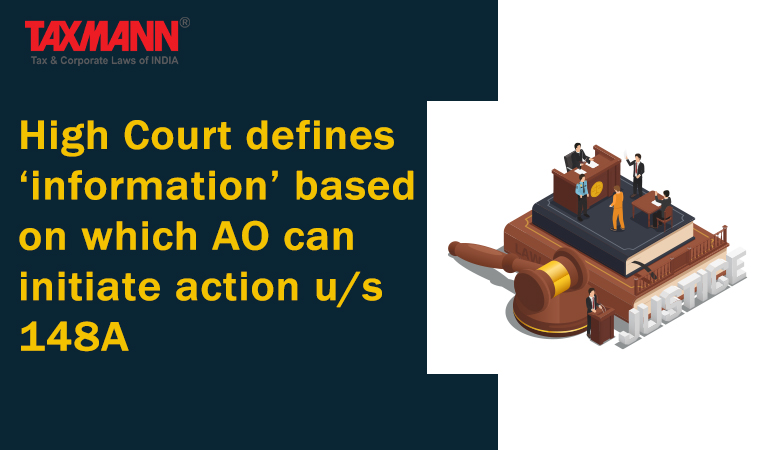High Court defines ‘information’ based on which AO can initiate action u/s 148A
- Blog|News|Income Tax|
- 2 Min Read
- By Taxmann
- |
- Last Updated on 10 October, 2022

Case Details: Stewart Science College v. ITO - [2022] 143 taxmann.com 80 (Orissa)
Judiciary and Counsel Details
-
- Jaswant Singh & Murahari Sri Raman, JJ.
- Prajnaraj Mohanty, Adv. for the Petitioner.
- Radheyshyam Chimanka, Sr. Standing Counsel for the Respondent.
Facts of the Case
The assessee was an educational institution, claiming exemption under section 10(23C). The Assessing Officer (AO) issued notice to the assessee seeking a response on cash deposits and non-furnishing of return of income. The assessee submitted that it was not required to furnish a return of income for such relevant assessment year as per the provisions of the Income-tax Act.
Upon considering such response, AO passed an order under section 148A(d) assigning reasons that the assessee accepted about the transactions made in the bank account. Accordingly, the case is considered a fit case for issuance of notice under Section 148.
The assessee filed a writ petition before the Cuttack High Court challenging the validity of the notice issued and reassessment proceedings initiated.
High Court Held
The High Court held that AO had the information which was described in the notice itself, i.e., information about the deposit of cash in the banks by the assessee. Section 148A uses the word “information” that provides power to AO to initiate action under this section.
The connotation of “information” in the context of reopening of assessment has succinctly been laid down by the Supreme Court in the case of Larsen & Toubro Ltd. v. State of Jharkhand [2017] 79 taxmann.com 267 (SC).
The Apex Court had held that information includes instruction or knowledge derived from external sources concerning facts, parties, or law relating to the assessment. Also, it includes the discovery of new facts or information available in the records not previously noticed.
The word “information” used in Section 148A is of the widest amplitude and should not be construed narrowly.
Suppose a mistake in the original order of assessment is not discovered by AO. However, on further scrutiny, if it came to the notice of another AO, or even by a subordinate or a superior officer, it would be considered as information disclosed to the incumbent officer.
In the instant case, the notice issued under Section 148A(b) demonstrated that the AO had in possession of “information” about the deposit of cash in the banks by the assessee. Accordingly, reassessment was justified.
Disclaimer: The content/information published on the website is only for general information of the user and shall not be construed as legal advice. While the Taxmann has exercised reasonable efforts to ensure the veracity of information/content published, Taxmann shall be under no liability in any manner whatsoever for incorrect information, if any.

Taxmann Publications has a dedicated in-house Research & Editorial Team. This team consists of a team of Chartered Accountants, Company Secretaries, and Lawyers. This team works under the guidance and supervision of editor-in-chief Mr Rakesh Bhargava.
The Research and Editorial Team is responsible for developing reliable and accurate content for the readers. The team follows the six-sigma approach to achieve the benchmark of zero error in its publications and research platforms. The team ensures that the following publication guidelines are thoroughly followed while developing the content:
- The statutory material is obtained only from the authorized and reliable sources
- All the latest developments in the judicial and legislative fields are covered
- Prepare the analytical write-ups on current, controversial, and important issues to help the readers to understand the concept and its implications
- Every content published by Taxmann is complete, accurate and lucid
- All evidence-based statements are supported with proper reference to Section, Circular No., Notification No. or citations
- The golden rules of grammar, style and consistency are thoroughly followed
- Font and size that’s easy to read and remain consistent across all imprint and digital publications are applied



 CA | CS | CMA
CA | CS | CMA
